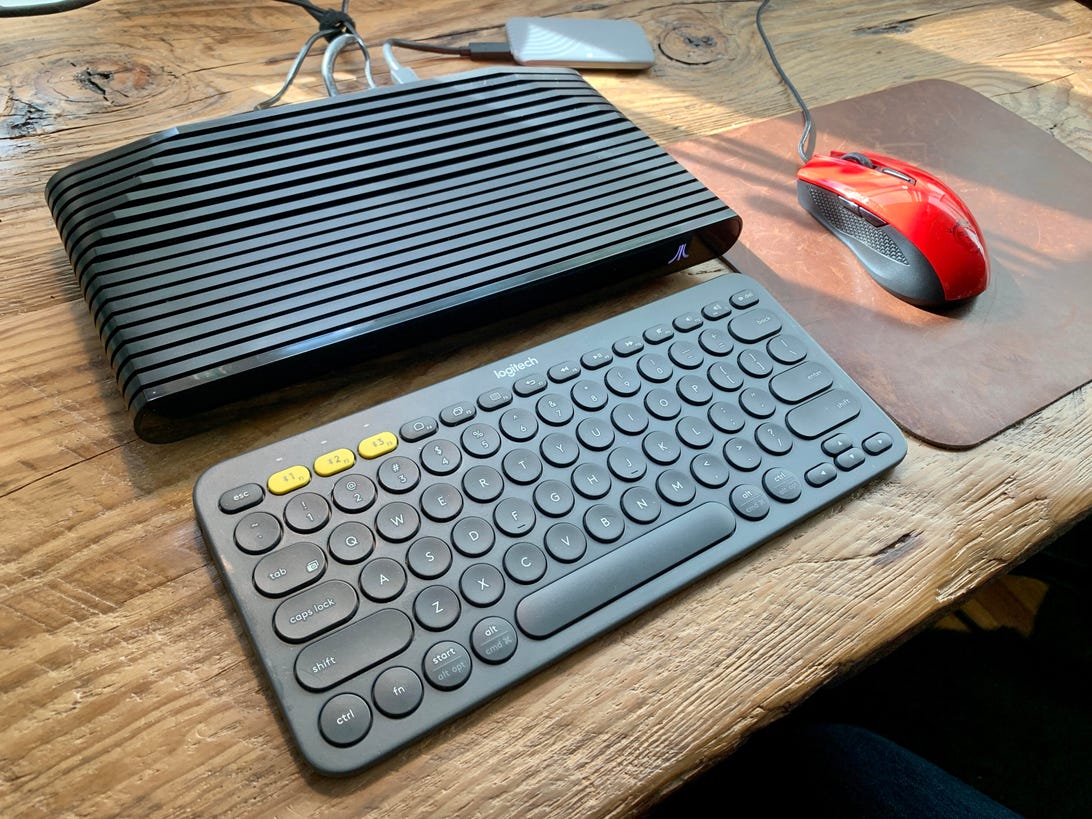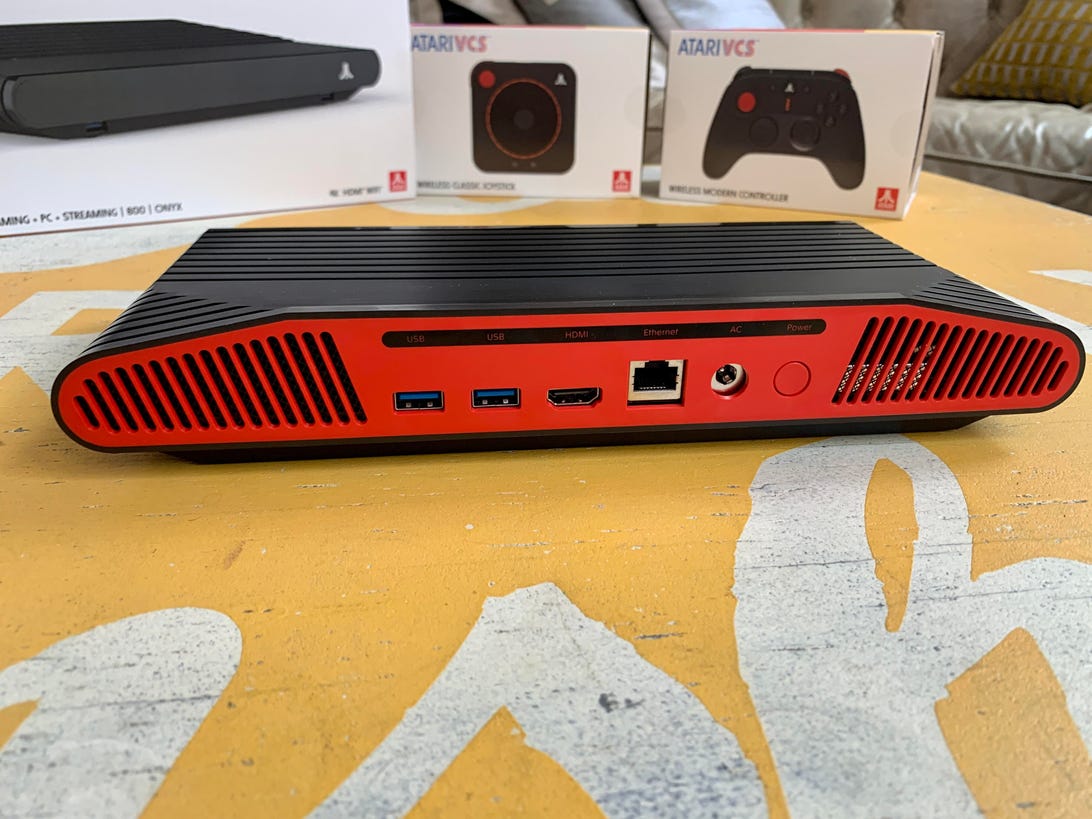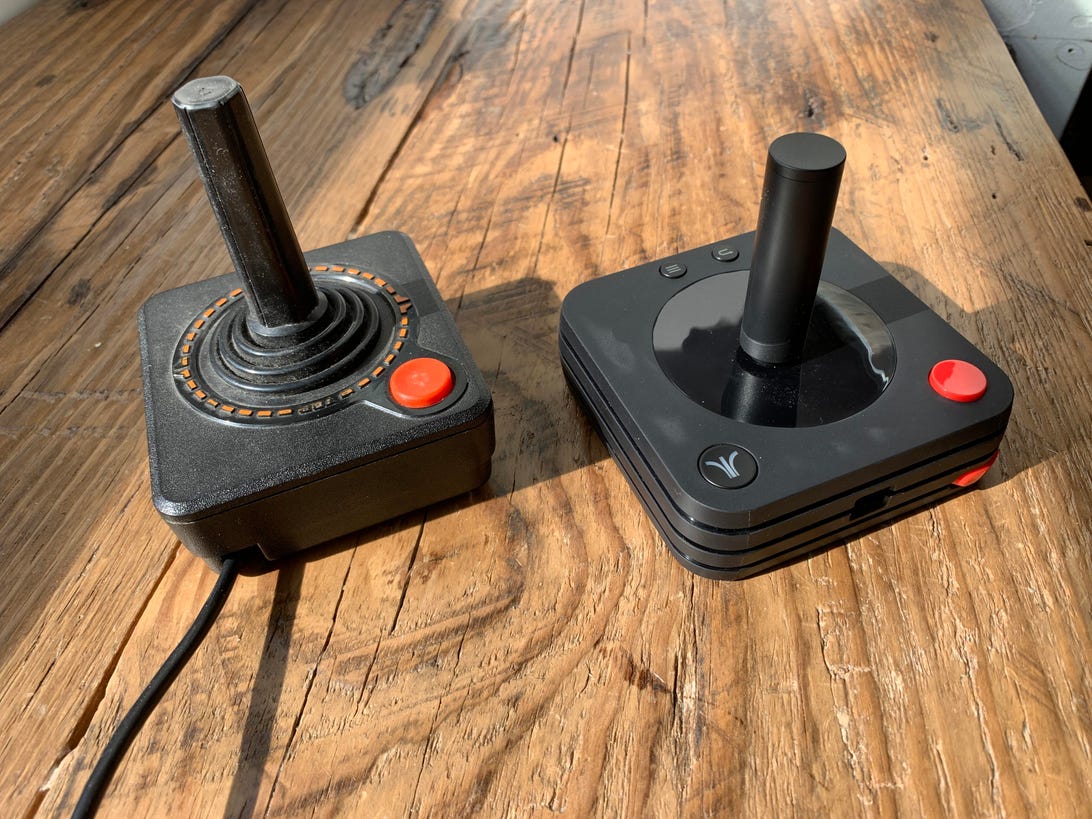
Like the storied brand it takes its name from, the new Atari VCS has a complicated history. Originally a crowd-funded project, now years overdue, it's finally starting to ship to crowdfunding backers and, soon, to the general public. Just as the original Atari company got caught up trying to figure out if it was a game console manufacturer, a software publisher, a computer maker or just a cultural icon, the Atari VCS feels similarly conflicted. It might be a game console. It might be a DIY-friendly, small-form-factor desktop PC. It doesn't fully satisfy as either, even at a modest $399 (which includes a wireless gamepad and a wireless retro joystick).
I first tried one of these systems out two years ago, when I was intrigued by the idea of a console that could also be a Windows or Linux PC. The idea of leaning so heavily on classic Atari games was probably the least interesting part of it for me, especially as these games are available in so many other places. If I want to play Asteroids, Crystal Castles or Centipede, even in various home console and arcade iterations, that's easy enough to do on almost any other platform.
That said, there's a real vintage, authentic vibe here, to both the hardware and software. This looks and feels like an Atari product, down to the clever re-implementation of the classic Atari 2600 joystick. But keep in mind that the Atari brand is just corporate IP now. It's been bought and sold over the years, and is now owned by a French game company formerly known as Infogrames.
A confusing identity
In my hands-on time with it, it's obvious that the Atari VCS suffers from an identity crisis. One pitch for it is as a game console. There's a lot of competition in that space, from the PS5 and Xbox Series X to the Nintendo Switch and the Xbox Series S. The Series S is $299 while the Switch Lite is $199, and both are far more capable pure gaming machines than this. If retro games are your thing, systems like the SNES Classic and Sega Genesis Mini are both under $100 and do a great job of making classic games easy to play on modern TVs.
Read more: PS5 and Xbox Series X are still sold out: Here's what to buy instead

The Atari VCS set up as a Windows 10 computer.
Dan Ackerman/CNETThe Atari VCS is much better thought of as a small form factor desktop, with a heavy DIY element. It runs an AMD SoC (system on chip) called the Ryzen R1606G, with just enough graphics muscle for light gaming and some expansion options like an internal M.2 slot. More importantly, you can skip the built-in Atari OS (basically a Linux-based catalog of games and a web browser) and run full Linux, Chrome OS or Windows 10 on it. Technically it supports the semi-abandoned SteamOS, too, but I wouldn't recommend that.
But there's a catch. The system only comes with its own Atari OS and a small 32GB SSD. To turn it into a real mini desktop, you need to install your preferred OS on either an external drive (connected via USB) or by adding an internal M.2 hard drive. It's a lot to ask of most people, and the entire project would make more sense shipping as a Windows or dual-boot machine.
I went through the process, installing Windows 10 on an external drive, and after a little troubleshooting, it worked fine. You could compare it to something like a Mac Mini, although the new M1-powered Mac Mini is much more powerful -- and more expensive.
Once I had Windows 10 running, naturally I installed some Steam games. Since it was built around classic Atari games, it's a stretch to ask it to do much modern gaming, I suppose. Recent indie darling Hades wouldn't run, neither would 3D Mark benchmarks. But my go-to low-power PC favorite, Deep Sky Derelicts, ran fine, as did Skyrim, at 1080p and medium settings. I also tried the new Microsoft Xbox Cloud Gaming beta, which worked well, as it's streaming from the cloud.
I could see myself using the Atari VCS hooked up to a monitor, keyboard and mouse as a fun mini desktop (and in fact, that's what I did for a few days). But you can also find more powerful hardware in a similar compact package. You're really paying for the console-like design, which is a fun conversation-starter at least. If you're using this as a desktop, however, keep in mind the internal fans will be cranking almost all the time and they can get pretty loud.

Two USB-A 3.0 ports, HDMI and Ethernet (don't worry, it has wifi).
Dan Ackerman/CNETRecreating the past
Taken as a standalone game console, the Atari VCS is a tough sell. It looks and feels a lot like the classic console (there's even a wood grain version), but once you turn it on, the available options are limited.
There are a lot of preinstalled Atari games, in both console and arcade versions. The recreations feel authentic, but really most of these will wear out their novelty value quickly. I like the ability to play, for example, the Atari 2600 version or arcade version of Asteroids. But many of the games, especially the more obscure ones, need instructions, which you have to click through and read on-screen. If you're anywhere close to my age, you'll recall those old console games all came with instruction booklets.
The menu and navigation feels fine at 1,920x1,080 resolution, but upping the output to 4K, while supported by the OS, results in a slow, stuttery experience. Not that Centipede needs to be in 4K.
A small, for now at least, storefront offers more classic games, plus a few newer ones, but nothing that you can't find on other platforms, and the newer or remastered games aren't anything you're likely to go out of your way to track down. The ecosystem feels underpopulated at the moment, which is another reason why the system makes more sense as a desktop PC.
The wireless gamepad is a perfectly good take on the Xbox controller style. Much more interesting is the semifaithful recreation of the classic one-button Atari joystick. It's frankly not that useful outside of the classic Atari console games, but it's also a great tribute to an iconic design.

A vintage Atari 2600 joystick next to the new VCS version.
Dan Ackerman/CNETThe new version has some extra features not found on the original, including a second shoulder button, and it's wireless. It also replicates the old Atari paddle controllers -- just rotate the center stick between your fingers and it acts like a paddle. On the other hand, it lacks that classic Atari controller stiffness, so doesn't have the same muscle-memory feel as the original. Both the gamepad and joystick are available as separate $60 purchases, or come included in the current $399 bundle.
If you are a huge Atari or retro gaming fan, there's a decent chance you already backed the crowdfunding campaign or else preordered a VCS system. For everyone else, it's an interesting device that doesn't quite nail it as a standalone console nor as a desktop PC. It's best to me right now as a fun Mac Mini alternative, although you'll be paying a premium to make your 2021 computer look like it came from 1977.
Article From & Read More ( Atari VCS hands-on: A computer-console hybrid with an identity crisis - CNET )https://ift.tt/2R9OiHm
Bagikan Berita Ini














0 Response to "Atari VCS hands-on: A computer-console hybrid with an identity crisis - CNET"
Post a Comment